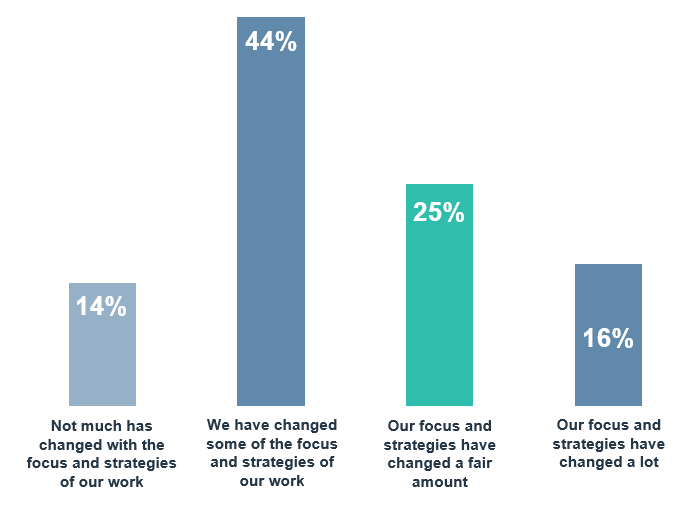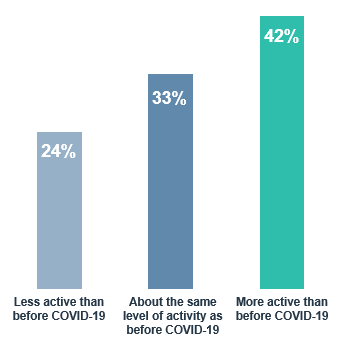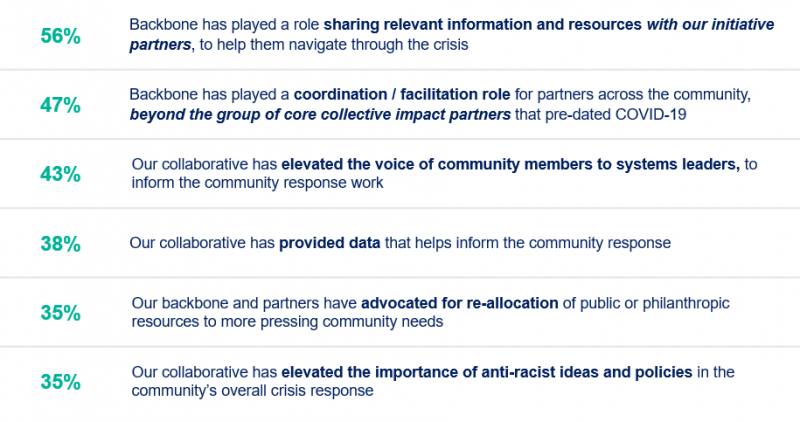In early July 2020, we asked how folks are responding to the moment we find ourselves in. The survey focused mainly on how collaborative work has changed as a result of the COVID-19 pandemic, and also recognized intersecting contexts of a prolonged economic downturn and increased focus on the Movement for Black Lives.
We received 144 respondents from practitioners with a variety of issue focuses including Education & Youth, Workforce Development, Community Development, Health & Nutrition, and many others. While over 75% of responses came from practitioners in the US, we also heard from those in Canada, Australia, Brazil, Israel, Mexico, UK, Morocco, New Zealand, Puerto Rico, and Peru. Despite the variety of local contexts, clear themes emerged and regional differences were not significant in most cases.
As outlined in the summary below, collective impact initiatives are responding in a range of meaningful ways to advance their community’s COVID-19 response efforts by leveraging the skills, relationships and assets that collaboratives have built over time. As communities turn from disaster response into long-term recovery planning, we encourage more collaboratives to engage in systems change work (e.g., policy, shifting resources, elevating anti-racism strategies) aimed at reconstructing more equitable systems across the globe.
We hope the shared learning of CI Forum community practitioners will support you in your response to continuously changes circumstances in your work.
In addition to shifting much of your work to virtual – which is a big change — how much has the focus, strategies, and/or content of your work changed since the COVID-19 pandemic started?

The majority of survey respondents noted some change to the focus and strategies of their collaborative’s work, both in terms of focus as well as intensity and speed. As stated by one respondent, “Our focus and strategies have not changed, but the depth and intensity, and speed has. We have added a lot of activities/projects that are aligned with our focus and strategies, and emphasizing the equity and trauma-informed values that we already have. Also, the state of emergency and urgency allows us to point more directly to the gaps in our systems that we already knew existed, and have the collective will to address them more boldly.” (Backbone)
The most common types of changes noted by respondents included:
- Adapting programs for COVID-safe delivery
- Shifting existing focuses altogether for emergency response
- New or more visible awareness of systemic inequities, often racial inequities, for those in positions of power
- Shifting strategies while maintaining common agenda
Is your collaborative / collective impact initiative more or less active during this time:

*Canada noted 38% less active, 23% same, and 38% more active, whereas US noted 19% less active, 37% same, and 44% more active
Perhaps due to the variety of issue area focuses, practitioners noted different activity levels compared to their work prior to COVID-19. The largest group of respondents reported being more active than before COVID-19, while a third of respondents noted the same level of activity. A fourth of respondents also noted being less active than before COVID-19. Based on the previously noted finding that initiatives have changed some of the focus and strategy of their work, the same activity level does not necessarily indicate that some collaboratives are operating “business as usual”.
Respondents who are more active than before indicated a range of factors contributing to their increase in activity:
- Increased issue awareness and urgency of collaboration
- Recognition of the collective impact effort and backbone as the community convener, and well positioned to convene across the community during these times
- “We have received more requests from partners to support new collective efforts due to COVID-19 because they value our experience as conveners and systems-thinkers.” – (Backbone)
- Required strategy adaptations for COVID-safe resource delivery
- Active role engaging in the necessary emergency response for COVID
Respondents who noted that their collaborative was less busy now than prior to COVID cited that their colleagues were being pulled in many directions to address organization-focused and personal needs. Several respondents also have experienced funding cuts and layoffs, leading some people to be more busy while others have had hours and responsibilities cut back.
What role has your collective impact effort played in your community’s crisis response to date?

Backbones most frequently reported sharing information and resources amongst partners, a role many backbones often played prior to COVID-19. In addition, nearly half of backbone teams reported facilitating and coordinating work across the community with new and different partners from prior to COVID – taking their backbone skills and applying them in different settings. They are also elevating resident voices to inform broader COVID-response work, using their cross-sector connections to highlight the true needs of community. These contributions from backbone and collaborative partners suggest that collective impact initiatives are directing skills and relationships built from past work to support crisis response efforts.
However, only about 1:3 respondents reported that their collaboratives were advocating for the re-allocation of resources or elevating the importance of anti-racist ideas and policies in the community’s overall crisis response.
What is working well?
Respondents noted some key commonalities when reporting what was working well for their collaborative’s response. These included:
- Increasing continuous communication through virtual and social media platforms
Many respondents noted higher participation in virtual meetings as well as more frequent meetings due to urgency. In addition, respondents reported more open lines of communication between colleagues and partners, some as a result of communicating outside of traditional business hours and through less formal means of communication. Social media has also been a common means of receiving direct feedback from the community about needs.
- Adapting resources to be delivered online
While lack of in-person contact makes some programs difficult to deliver, others have found success in adapting resources for online delivery. Some have experienced greater awareness and distribution of these resources as a result of sharing via social media.
- Embracing “We are all in this together”
It may seem cliché, but in a time of crises, respondents have noted that their communities have embraced the sense of being a team. This has resulted in faster response time, greater ease in reallocating resources, and increased willingness to collaborate, which has resulted in the more open lines of communication noted above.
“Our work has been a catalyst for rethinking what is possible in leveraging the relationships of all of our community associations toward a common identity and set of values.” (Backbone)
- Leaning on existing relationships
Several respondents noted that their collaboratives already knew the map of actors, shared past wins, and developed collaboration muscles prior to COVID. Many experienced partners are coming back to the table with new urgency who had previously faded away from collaborative work.
- Having empathy for colleagues
In a season where individuals are experiencing deep stress and trauma, colleagues are being careful to consider each other’s needs and be flexible to supporting their partners. This can be as simple as starting each meeting with a personal check-in to offering grace for schedule changes and unexpected co-hosts (Kids! Pets! Roommates!) on Zoom meetings.
- Listening willingly and requesting boldly
Some noted that the urgency of the moment allowed an opportunity to speak more transparently instead of modifying speech in order not to offend the oppressor. Some found this was the moment for community members from historically marginalized identities to ask boldly and demand to be included in decision-making roles, and others (typically in positions of power or dominant identity) have recognized the importance of stepping back and listening to hear the needs of the community.
What seems to be most challenging for your collective impact work?
While challenges abound in times of crisis, the most frequently noted challenges to collective impact work included:
- Adapting strategies for social distancing
While some programs can easily be adapted for COVID-safe delivery, others are more difficult.
- Lack of in-person relationships, especially with community members
Practitioners are communicating more often than before, but lack the relationship-building elements of working together in person.
“Even with remote access for professional partners, it hasn’t been the same with our parents – those giving voice to lived experiences” – (Backbone)
- Zoom fatigue
With everything from work to personal life shifting to video conferencing platforms, many are seeking new solutions for connecting.
- Shifting and competing priorities for partner organizations
Organizations are facing internal pivots and strategy changes that can compete with attention needed for collaborative work.
- Uncertainty for long-term planning
Long-term planning can be difficult when such urgency is placed on the present needs of the community and so little is known about what the future will bring.
- Budget cuts and furloughs
Many organizations are affected by economic downturn and have faced funding cuts and layoffs.
- Individual stress and trauma
Our colleagues and partners are seeking to accomplish urgent work while living as whole people facing the individual and collective trauma of our time.
Has there been anything that has surprised you about the changes that you’ve experienced or seen since the pandemic began?
Despite the challenging times we face, many found positive surprises such as:
- Seeing the adaptability and innovation of the collaborative
- Increasing awareness of the need for continuous action in racial equity work
- Recognizing the effectiveness of virtual work
- Increasing commitment and participation in the collaborative
- Noticing the generosity, care, and willingness to listen between partners
Others noted disappointing surprises such as:
- Political polarization in the community despite tensions between competing organizations subsiding
- Feelings of fear that newfound awareness of anti-Black racism will quickly subside, without real progress toward systemic change being achieved
- Slowness of government partners in some cases, and quickness of response in others
Is there anything else that you would like to share with respect to how your collective impact initiative is navigating its work during this time of crisis?
Many respondents in this section noted one common struggle: people are exhausted. This season of crisis has resulted in passionate and dedicated CI practitioners who are fueled by deep urgency to serve and support the most affected and marginalized in their communities. Yet, all are doing so while balancing organizational struggles, transitions to virtual work, family needs, mental health issues, and many other pressing priorities. Practitioners are enduring new and continued stress and trauma due to the combined crises of COVID-19, the economic downturn, and anti-black racism.
While we do not have the answer to solving this struggle of exhaustion, we encourage you to have grace for one another, engage in community care, and seek healing where appropriate and possible.
What do you think?
When reading what community members shared, what resonates with you? What is similar with your experiences? What might be different? Please share your thoughts in the comments below.
RELATED RESOURCES
- Managing Change During the Pandemic: Thoughts for Collective Impact and Nonprofits
- Scenario Thinking for an Unpredictable Year: Status Quo is Not an Option
- Reimagining Strategy in the Context of the COVID-19 Crisis: A Triage Tool
- Learning in a Time of Crisis
- Collaborating During COVID-19
- Allies and Co-Conspirators: Stepping up to support Anti-Racism
- Holding Hard Conversations and Moving Beyond Neutrality
